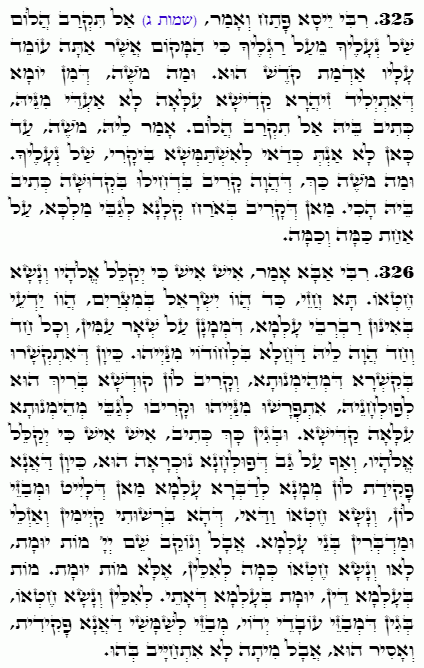Daily Zohar # 4596 – Emor – Take your sandals off your feet
Daily Zohar 4596

Hebrew translation:
326. רַבִּי אַבָּא אָמַר, אִישׁ אִישׁ כִּי יְקַלֵּל אֱלֹהָיו וְנָשָׂא חֶטְאוֹ. בֹּא רְאֵה, כְּשֶׁהָיוּ יִשְׂרָאֵל בְּמִצְרַיִם, הָיוּ מַכִּירִים אֶת אוֹתָם הַגְּדוֹלִים שֶׁל הָעוֹלָם שֶׁמְּמֻנִּים עַל שְׁאָר הָעַמִּים, וּלְכָל אֶחָד וְאֶחָד הָיָה לוֹ פַּחַד לְבַדּוֹ מֵהֶם. כֵּיוָן שֶׁנִּקְשְׁרוּ בְּקֶשֶׁר הָאֱמוּנָה, וְקֵרַב אוֹתָם הַקָּדוֹשׁ בָּרוּךְ הוּא לַעֲבוֹדָתוֹ, נִפְרְדוּ מֵהֶם וְקָרְבוּ לָאֱמוּנָה הָעֶלְיוֹנָה הַקְּדוֹשָׁה. וּמִשּׁוּם כָּךְ כָּתוּב אִישׁ אִישׁ כִּי יְקַלֵּל אֱלֹהָיו, וְאַף עַל גַּב שֶׁזּוֹהִי עֲבוֹדָה זָרָה, כֵּיוָן שֶׁאֲנִי הִפְקַדְתִּי לָהֶם מְמֻנֶּה לְהַנְהִיג אֶת הָעוֹלָם, מִי שֶׁמְּקַלֵּל וּמְבַזֶּה אוֹתָם, וַדַּאי וְנָשָׂא חֶטְאוֹ, שֶׁהֲרֵי בִּרְשׁוּתִי עוֹמְדִים וְהוֹלְכִים וּמַנְהִיגִים אֶת בְּנֵי הָעוֹלָם. אֲבָל וְנֹקֵב שֵׁם ה’ מוֹת יוּמָת, לֹא וְנָשָׂא חֶטְאוֹ כְּמוֹ לְאֵלּוּ, אֶלָּא מוֹת יוּמָת. מוֹת בָּעוֹלָם הַזֶּה, יוּמָת בָּעוֹלָם הבָּא. לְאֵלֶּה וְנָשָׂא חֶטְאוֹ, מִשּׁוּם שֶׁמְּבַזֶּה מַעֲשֵׂי יָדָיו, מְבַזֶּה אֶת הַשַּׁמָּשִׁים שֶׁלִּי שֶׁאֲנִי הִפְקַדְתִּי, וְאָסוּר הוּא, אֲבָל מִיתָה לֹא הִתְחַיְּבָה בָהֶם.
.
Zohar Emor
Continued from previous DZ
#325
Rabbi Yessa opened and said,
Exodus 3:5
“וַיֹּאמֶר אַל תִּקְרַב הֲלֹם שַׁל נְעָלֶיךָ מֵעַל רַגְלֶיךָ כִּי הַמָּקוֹם אֲשֶׁר אַתָּה עוֹמֵד עָלָיו אַדְמַת קֹדֶשׁ הוּא.”
“Then He said, “Do not draw near this place. Take your sandals off your feet, for the place where you stand is holy ground.”
From the day he was born, Moses was never without the holy radiance, and yet it is written about him, ‘Do not come closer,’ the Holy One, Blessed be He, said to him, ‘Moses, until now, you are not worthy to use my honor. Take off your sandals.’ If Moses was told this despite approaching with awe and holiness, how much more so for anyone who approaches the king with disrespect?
#326
Rabbi Abba said, “Any man who curses his God shall bear his sin” (Leviticus 24:15). Come and see when Israel was in Egypt, they were aware of the seventy ministers appointed over other nations, and each had its own idol god. Once they were bound by the bond of faith, the Holy One, Blessed be He, brought them closer to His service. They separated from these idols and drew near to the supreme and holy faith. Therefore, it is written, ‘Any man who curses his God,’ meaning one of these seventy ministers mentioned above. Even though it is idolatry, since I appointed them to govern the world, whoever curses and insults them ‘shall bear his sin’ indeed. They exist and function by My command and govern the world’s people.
But ‘whoever blasphemes the Name of YHVH shall surely be put to death’ (Leviticus 24:16). It does not say ‘he shall bear his sin’ as with these seventy ministers, but ‘he shall surely be put to death’—death in this world, and he shall be put to death in the world to come. As for these seventy ministers, one who curses them ‘shall bear his sin’ because he insults my appointed servants, and this is forbidden. However, he is not liable to death for this.
Lesson;
Despite Moses’ unique status and his constant connection to the Holy Light from birth, he was still commanded to remove his sandals to disconnect from Malchut and attain a higher elevation. If such reverence was required of Moses, who approached with awe and holiness, it is even more critical for anyone else to avoid disrespecting Hashem.
The distinction between cursing the ministers and blaspheming the holy Name highlights the different offense levels and the corresponding punishments. Insulting the ministers incurs sin but not death, while cursing the Name of Hashem incurs the ultimate penalty.
When we pray to Hashem, we should remember that he is in front of us. Therefore, we should act as if we are in front of the Holy King. We should be clean in body and soul and dressed properly.
{||}

 Previous: Emor
Previous: Emor

